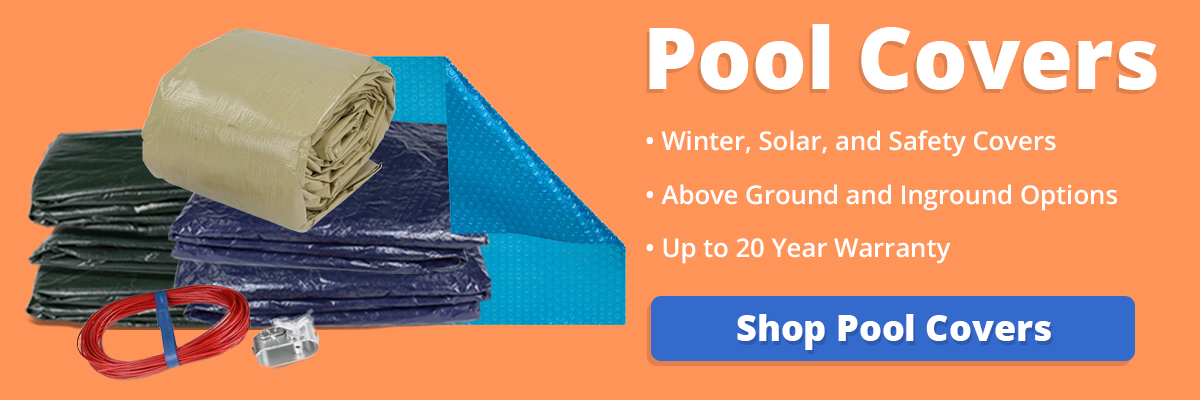With a pool heater, you can get more use out of your above ground pool by delaying that inevitable closing and opening the pool earlier in the spring. In colder climates, a heater can extend the pool season by a good couple of months and in warmer parts of the US, using a heater can make it possible to keep your pool open at a comfortable temperature all year round. Here we’ll discuss various options for making above ground pools less cool.
Click Here to View Our Above Ground Pool Heaters 




Nathan Posted: 5/27/2021
I have a 24' round 54" deep pool, my wife's co-worker has a propane pool heater for sale it is a hayward 100,000 BTU, is this a big enough heater for the pool size?Reply
InyoPools Product Specialist Matt S. Posted: 6/4/2021
Yes, that is a big enough heater for your pool size. You can go bigger if you want to get the pool up to temp quicker.Reply
Vin Posted: 5/11/2021
Hi. I have a small 12 foot above ground pool. I live in Long Island NY. What would you recommend in regards to heating my pool? We plan on using almost every day.Reply
InyoPools Product Specialist Matt S. Posted: 5/13/2021
For a pool of that size a Raypak 106A model would suit it fine. Make sure you pick the correct gas type (Natural Gas / Propane).Reply
Brandon Posted: 3/9/2020
I have a 52 by 30 round vinyl pool what would you recommend I live in north Texas tksReply
InyoPools Product Specialist Matt S. Posted: 3/10/2020
It would depend on your desired swim temp, but for a pool that size in that area, I would say a 105k BTU should be ok. If you want faster heating times, then the larger, the better.Reply
Walter Posted: 12/22/2019
I have only had this up and running a couple days. I was very impressed it took my 24,000 gallon pool, from 65 - 80 in 30hrs. I live here in North Carolina it has still gotten cold at night as well. I am impressed. It was easy to hook up. It stops as soon as it detects no water flow. I will update if I feel different.Reply
vanessa aycart Posted: 12/13/2019
i have a 24x12 rectangle pool what is the best option for heatingReply
InyoPools Product Specialist Robert M. Posted: 1/3/2020
Hello Vanessa - The best option will depend on a few different factors. Where is the pool located? Are you looking to heat the pool all year or just extend the pool season? What is the desired temperature? Do you plan on using a solar blanket?Reply
Trina Posted: 10/24/2019
We have a 12' X 52" round pool and live in central Florida. What are my best options for a pool heater?Reply
InyoPools Product Specialist Robert M. Posted: 11/4/2019
We'd recommend a solar panel or a small electric heater (5.5kw-11kw).Reply
Ruth Ison Posted: 9/10/2019
I have just installed an above ground 24' round pool and would like some tips on size and what type of heater to install??? I live in southern SC where we have moderately mild winters....very humid and warmer through October... Thank you in advance....Reply
InyoPools Product Specialist Matt S. Posted: 9/12/2019
Which one is best for your area, depends on utility, and gas prices, the air temp and the temperature you want to maintain. We have a list oof the things that need to be compared when making this decision: Swimming Pool Heater or Heat Pump?Reply
Cigi Posted: 6/13/2019
First time above ground pool owner here in VA. What would your recommendation be to heat my 18 x 48 pool?Reply
InyoPools Product Specialist Matt S. Posted: 6/14/2019
Hello - is this an 18' round with 48" walls, or an 18' X 48' oval.Reply
Cigi Posted: 6/14/2019
It is an 18 x 48 round pool.Reply
InyoPools Product Specialist Matt S. Posted: 6/14/2019
60K BTUs or higher.Reply
Cigi Posted: 6/14/2019
Thank you!!Reply
Brandy Hunter Posted: 6/11/2019
I have an 18 foot above ground vinyl pool. What would be the best heater?Reply
InyoPools Product Specialist Matt S. Posted: 6/13/2019
60K BTUs or higher.Reply
Scott Posted: 5/31/2019
I live in pa I just installed a 30 ft round above ground 54in depth I’m going to use propane for gas supply how many BYU’s do you suggest and is one brand better than the other thank youReply
InyoPools Product Specialist Matt S. Posted: 6/6/2019
I would not go with anything less than 100k BTUs just for the sake of efficiency. For pool heaters, bigger is better, so it never hurts to upsize to make sure there is enough oomph on those colder days.Reply
Fran Posted: 5/20/2019
I have a 27ft round pool. What do u suggest. It is 80 here todayReply
InyoPools Product Specialist Matt S. Posted: 5/21/2019
What temperature are you wanting to keep the pool?Reply
Mike Posted: 5/8/2019
I live in ohio. We have a 24 foot above ground pool. What do you recommend to use as a heater to get more use out of our poolReply
InyoPools Product Specialist Matt S. Posted: 5/8/2019
It depends on the temperatures you are attempting to maintain, and the time of year you plan to use the pool. As a rule, if you are in the North and want to extend your season, the best route is to oversize the heater. I would not go with a gas heater lower than 130,000 BTUs.Reply
InyoPools Posted: 8/15/2018
Hello Monica - If your pump is running 24/7, you don't need to worry about a timer for the heater. You can save some money on the electric bill if you add a timer to the pump and wire the heater to the same timer.Reply
Inyopools Posted: 7/18/2018
Hello St Peter - If you are looking to occasionally heat the pool, the best option would be a gas heater. A gas heater will heat the pool much quicker than a heat pump or solar panels. I would recommend something around 250k btus for a 27' pool.Reply
MONICA Posted: 5/17/2018
Purchased my heater from your company. All set to go, however I thought I would need a timer for the heater. Now I've talked to a pool installer he says all I need to do is use the thermostat to set it at the temp I want it to stay. Is this correct? Thanks:)Reply
Inyopools Posted: 5/15/2018
Hello Michelle - Solar panels are the most energy efficient option. They typically give you around a 10° increase as long as the panels are receiving a lot of sun. The next option would be a heat pump. These work well as long as the ambient temperature is staying above 60°. The heat pumps work like AC units except for that they generate heat from the outside air.Reply
Michelle Posted: 5/15/2018
I have an 18’ 54” deep above ground pool and I’m looking into a heater for it. I live in southwest Ohio and I could use some guidance on what would be my best option. I’ve looked into a propane heater but I’m worried about it costing to much to run. Any suggestions?Reply
St Peter Posted: 5/12/2018
I live in Northern Maine, temps avg in the 70s most of the summer with some warmer days in the 80s. I own a 27 ' round 48" deep salt water pool that we would enjoy more if it was warmer. I do have a solar cover to use. I'm looking for advice on what the best form to heat it would be. We would love to use it on weekends and sometimes during the week if we had guests over. Any advice would be greatly appreciated. We really only have second half of June to end of August to use it before we need to close it up for Fall. Thank you.Reply
Inyopools Posted: 3/22/2018
Hello LD - We'd recommend something around 250-300k btu's. As far as the gas line depth, we'd recommend contacting a local gas company (or licensed pool company). They will know the requirements for your line.Reply
LD Posted: 3/22/2018
I have an oval 18x34 above the ground pool. I am seriously thinking of having a gas heater installed. I get moderate to little sun due to excessive trees in my neighbors yard. What BTU would you suggest, and how deep does the gas line have to be underground? thanksReply
Inyopools Posted: 3/21/2018
Hello TMEd - I'd recommend something around 250k btus for your pool. Something like that would give you between 1° to 1-1/4° F. rise per hourReply
TMEd Posted: 3/17/2018
We have a 28' diameter x 54" wall height above ground pool and live in Ohio. I'm wondering what you would recommend for heating enough to extend our pool season to include May and September.Reply
Inyopools Posted: 11/2/2017
Anmonymous (Mohave pool) - Assuming you don't want to go thorough the expense of installing panels on a roof, I would recommend the Sunheater 2' x 20' Solar Heating System. And assuming your 8'x16' pool is 4' deep, your pool contains about 4'000 gallons of water. For your size pool, I'd recommend a Hayward VL Series Sand Filter Systems. It is designed to handle pools up to 11,000 gallons so it will easily handle the extra load of the solar heater.Reply
Anonymous Posted: 10/27/2017
we live in the Mohave desert near Needles. We have an 8'xl6' above ground pool. What is the best solar heating set-up for us? What kind of pump should we have?The pool is under a covered porch on the West side of the house but lots of sun in the yard & on the porch roof.Reply
Inyopools Posted: 10/13/2017
Larko - For your size pool, I'd recommend a small size gas heater like a Hayward A/G Pool Heater 100000 BTU LP. If you have natural gas in your area, buy the NG version for lower operational costs. The heater will raise the water temperature in your pool about 15 degrees in an 8 hour period. Also, buy a solar blanket to help keep the heat in when not in use.Reply
Larko Posted: 10/8/2017
We have a 16x32 ag pool. Interested in buying heater to extend season. What are your recommendations?Reply